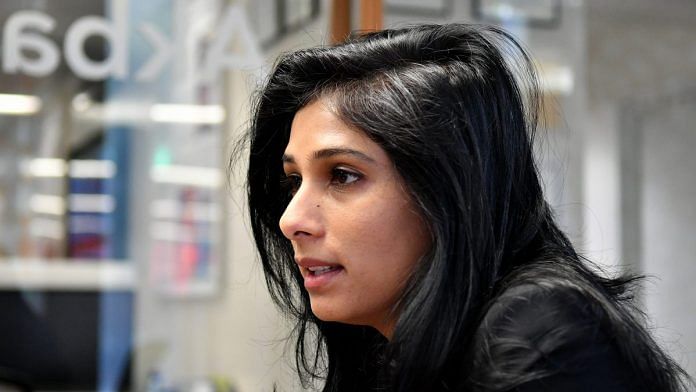New Delhi: India should eliminate wasteful spending and bring out a credible disinvestment plan, Gita Gopinath, chief economist at the International Monetary Fund, said Thursday.
Delivering the National Council of Applied Economic Research’s C.D. Deshmukh lecture, Gopinath stressed the need for India to look at ways to increase revenues and curb wasteful expenditure, and come out with a credible medium-term fiscal plan that can be achieved once the pandemic ends.
“Credibility on all these fronts will give confidence to markets and keep borrowing costs low during the transition period (from the pandemic to the post-pandemic period),” Gopinath said, adding that India also needs to shore up its GST collections.
Gopinath’s comments come just four days before Finance Minister Nirmala Sitharaman is set to present the Union Budget 2021-22, which will have to focus on reviving economic growth after two subsequent quarters of economic contraction between April and September.
Also read: India’s fast economic recovery will surprise everyone in 2021-22: NITI Aayog’s Rajiv Kumar
Protecting the poor
Gopinath said inequality and rising poverty is a big risk for many countries including India, but flagged the fact that data on poverty and jobs is either lacking, or comes with a lag.
She stressed that support measures announced by India to protect the poor and marginalised sections of society during the pandemic — both cash and kind — should continue in the calendar year 2021 as well. India had given free food grains as well as small cash handouts to the poor during the pandemic. However, while the cash handout of Rs 500 per month lasted just for the initial lockdown period of April-June, the free foodgrains scheme ended in November.
IMF’s chief economist added that the Mahatma Gandhi National Rural Employment Guarantee scheme, commonly known as MGNREGA, should be kept in an expanded form in the coming year as well.
The government had announced an additional Rs 40,000 crore allocation for MGNREGA, over and above the Rs 60,000 crore initially budgeted, taking the total allocation to over Rs 1 lakh crore.
“India can do more to provide support to poorer households,” Gopinath said. She added that just seeing the “aggregate amount” of allocations may not be enough; one needs to see the distribution as well.
Gopinath also stressed the need for countries to continue with their accommodative stance.
“For now, it would be damaging to start tightening in the midst of the pandemic. It would hit the long term potential of countries. They should provide policy support as long as they are in the midst of the pandemic,” she said, adding that the countries should come out with a credible medium-term fiscal plan.
Caution over IMF projections
Gopinath also sounded a note of caution over IMF’s growth projections for India for calendar year 2021. The IMF had forecasted that India will grow at 11.5 per cent in 2021, against a contraction of 8 per cent in 2020.
“The 11.5 per cent growth in 2021 comes from a severe collapse that happened in 2020 (-8 per cent). A lot of it is pretty mechanical,” she said, adding that one should remember that over two years, India will only grow at 2-3 per cent rather than the usual growth of around 12 per cent.
Also read: Indian economy begins to show signs of recovery as Covid begins to decline




Fail system.Full of lies
Disinvest is difficult, look at whats happening to the farm sector.